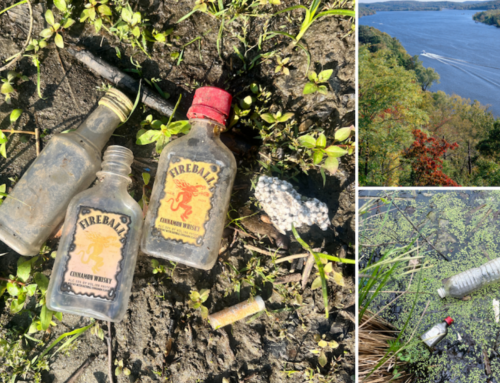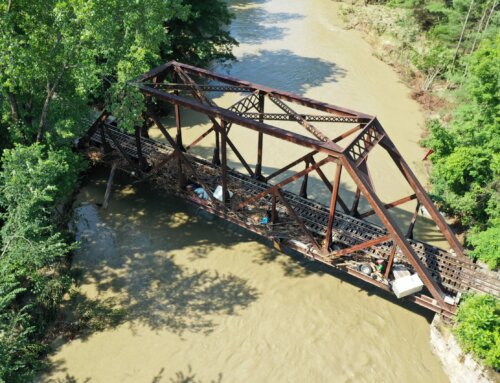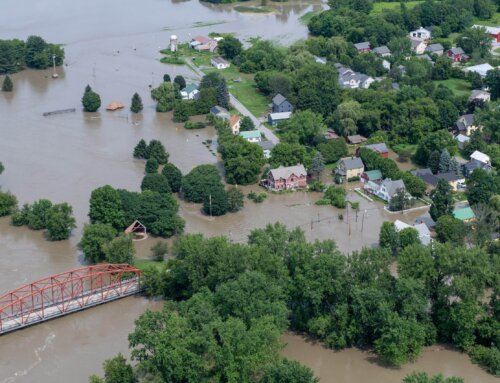December 6, 2019
John Fischer
Massachusetts Department of Environmental Protection
1 Winter Street
Boston, MA 02108
Submitted electronically to: dep.swmp@mass.gov
Re: Draft Massachusetts 2030 Solid Waste Master Plan
Dear Mr. Fischer,
The Connecticut River Watershed Council, Inc. (CRWC), doing business as the Connecticut River Conservancy (CRC), is a nonprofit citizen group established in 1952 to advocate for the protection, restoration, and sustainable use of the Connecticut River and its four-state watershed. On September 27 and 28, 2019, CRC hosted our 23rd annual Connecticut River watershed Source to Sea Cleanup. In Massachusetts alone, we had 1,200 volunteers clean up at over 50 different locations along and in our waterways. Below are some key accomplishments of the groups that participated in this year’s event from the Massachusetts part of our watershed:
- 95,547 lbs of trash found and properly recycled or disposed of, including those listed below
- 967 tires (600 from a tire dump site in Greenfield)
- 22 mattresses
- 32 paint cans
- 1,100 single use plastic bags
- 20,000 beverage containers of all types, including 4,900 plastic water bottles and 4,481 nip bottles
- approximately 145 gallons-worth of Styrofoam particles
- 150 batteries
- 37 pieces of furniture
- 93 automotive-related items
- 94 clothing items
- 253 pharmaceuticals/syringes
- 59 toys/balloons
These items are typical of what we find every year, although our volunteer numbers in 2019 were an all-time high. The trash we find in our cleanups represents a combination of single use trash items and things that are difficult to dispose of, such as mattresses, electronics, furniture, and tires. In the past couple of years, we have also noted an uptick in homeless encampments near our rivers. As part of our mission to advocate for clean rivers, we have been actively working on trash reduction efforts that we see are contributing to the trash we find in our rivers. As such, we have reviewed the draft Massachusetts 2030 Solid Waste Master Plan (SWMP) with interest, and we offer thoughts outlined below.
Overall comments
SWMP needs to tie into international trash issues
There are two very large global environmental issues that relate to solid waste at the moment: climate change/carbon emissions and plastic in our oceans. The draft SWMP speaks to neither of these issues. CRC recommends that MassDEP tie these into the SWMP and develop concrete steps for contributing positively to both of these problems.
DEP should consider climate impacts on all decisions, and attempt to quantify carbon savings through plastics use reductions and reductions from burning plastics and tires, whether in state or out of state. DEP should include in the SWMP an analysis how waste management ties into the Global Warming Solutions Act.
Massachusetts should develop a Marine Debris Reduction Plan (as Virginia has done – see https://www.deq.virginia.gov/Programs/CoastalZoneManagement/CZMIssuesInitiatives/MarineDebris.aspx ). This would involve 1) identifying the items Massachusetts is contributing to in the marine environment (these would be items found in Massachusetts coastal areas as well as Massachusetts rivers that flow into coastal areas of Rhode Island, Connecticut, and New York) and 2) prioritizing actions to reduce those items. Massachusetts could participate on the national level as well. We recommend that DEP also look to the European Union’s plastic strategy as a possible way to move forward.
SWMP needs more specifics on how goals will be met
In 2000, MassDEP reported that we were disposing of 6.5 million tons of trash annually. In 2010, statewise trash generation was reduced to 5.43 million tons. Further reductions stalled and in 2018, we were at 5.5 million tons. Over the past decade we have not achieved the 30% reduction goal from the 2020 SWMP for various reasons. The current SWMP does not identify why we have not met our goals, and it’s not clear from the draft 2030 SWMP how we will magically meet our new goals. Overall, the plan needs to be more aggressive and concrete.
The plan needs to have more opportunities for measuring progress, and also allow for adaptive management. MassDEP has stopped reporting diversion through recycling and composting, apparently because it is impossible to account for all ways of diversion. We acknowledge the difficulty. We note that is undoubtedly the case with all estimations, even the ones that MassDEP has reported on for the draft SWMP. However, MassDEP should still create a way to track trends, understand what is happening, and provide that information to the public (good and bad). All accounting will be imperfect; that doesn’t mean it should be altogether abandoned. MA residents and businesses need the data to push for change where it is most needed.
Circular Economy
Perhaps the concept of zero waste does not seem attainable. We suggest that the concept of a circular economy could be beneficial as a way of looking at it. There could be ways of businesses and the economy working at every step of the way. The current system in which companies make an enormous profit selling products that then the public and government need to spend money to dispose of does not make sense. MassDEP needs to be a key player in shifting the costs away from municipalities, the state, and individuals. Even if DEP cannot pass legislation, it can provide the public better justification and incentives to create extended producer responsibility (EPR) programs, and it can incentivize recycling as DEP has done for mattresses. Where single use plastics can’t be eliminated, recycling should be increased. The European Union has a list of companies voluntarily pledging to increase their use of recycled plastics in Europe, and many of these companies sell products in the U.S. also (https://ec.europa.eu/growth/content/european-strategy-plastics-voluntary-pledges_en). These companies would be an obvious partner for U.S. states, regions, or the federal government to work with.
The SWMP should identify a goal of equal access to trash reduction and disposal
The increase in homelessness over the last several years means also increase in trash in the environment, because disposal options for homeless encampments are minimal. In 2018, it was estimated that there were 20,000 homeless people in Massachusetts. When we conduct our Source to Sea Cleanup every year, we clean areas where homeless people live or lived, being careful not to dismantle existing homes. People with no access to kitchens and homes for storage are forced to use predominantly single use items. Towns with significant homeless populations should be supported and given an incentive to offer disposal options to all.
Specific comments
Priority categories for trash reduction should take into account environmental impact as well as volume
Appendix B of the draft SWMP includes a large table with detailed material categories and 2018 disposal rates vs. 2030 disposal goals. The SWMP goals focus on the largest volumes that could be diverted from the trash – cardboard, compostables, construction & demolition debris, and textiles. We think composting as much as possible is very important to do. On the other hand, food waste is not going to last for thousands of years the way plastics will. DEP should also take into account toxicity and impact on the environment when prioritizing, not just volume.
Our cleanup groups consistently find tires in our rivers and over 50% of them are tires that have been dumped since 2000. Appendix B indicates that only 30,947 tons of tires are disposed of in MA, and the table indicates that tires are banned from combustion in Massachusetts. It’s estimated states generate approximately one passenger tire per person per year (https://www.ct.gov/deep/cwp/view.asp?A=2714&Q=324902), and the population of MA was 6.9 million people in 2018. It’s not explained in the SWMP, but the vast majority of tires in MA are being burned as tire derived fuel at paper mills in Maine. Why is it okay to burn them out of state but not in state? It appears we don’t mind foisting the toxic emissions off on another state. We encourage MA to put tires at a higher priority level than medium-low, and to work with other New England states to put together an extended producer responsibility program together for tires.
Reducing items that are hard to recycle
Page 9 shows that one of the state’s top priorities is to “reduce or phase out materials that are difficult to recycle.” This is fine, and we support it. The document highlights “target single use packaging” and “encourage better packaging and purchasing habits to reduce waste” as actions to address this priority. The document is not aggressive enough in documenting specific ways that single use packaging will be reduced. It should not be left to the consumer to make purchasing choices, such as stop purchasing chips in non-recyclable bags, when there is no alternative. This isn’t going to work. We need the document to commit to working regionally or nationally to create incentives for different packaging. DEP can put together a program to evaluate banning items or promoting EPR. We recommend the MA SWMP add a strategy table such as that articulated by the European Union on page 4 of the following pdf file (labeled page 3 in the publication): https://ec.europa.eu/environment/circular-economy/pdf/single-use_plastics_proposal.pdf. The table is also copied below.
European Union’s single use plastics proposal (document linked in paragraph above)
| Consumption reduction | Market restriction | Product design requirement | Marking requirements | Extended producer responsibility | Separate collection objective | Awareness raising measures | |
| Food containers | X | X | X | ||||
| Cups for beverages | X | X | X | ||||
| Cotton bud sticks | X | ||||||
| Cutlery, plates, stirrers, straws | X | ||||||
| Sticks for balloons
Balloons |
X | ||||||
| X | X | X | |||||
| Packets & wrappers | X | X | |||||
| Beverage containers, their caps & lids
– Beverage bottles |
X | X | X | ||||
| X | X | X | X | ||||
| Tobacco product filters | X | X | |||||
| Sanitary items:
– Wet wipes – Sanitary towels |
X | X | X | ||||
| X | X | ||||||
| Lightweight plastic carrier bags | X | X | |||||
| Fishing gear | X | X |
Residential Waste Reduction
We support a waste ban for mattresses and textiles. Textiles are already easy to donate through other organizations. DEP has done a great job putting together a mattress recycling program. Mattress recycling options should be made available to all.
MassDEP should analyze single stream vs. multi- or dual-stream recycling. We suspect that single stream has not been the panacea it was described to be. It has led to increased contamination of recyclable materials – in fact, Figure 2.1 in the SWMP indicates that paper and cardboard are still 18% of the waste stream. Also, it seems to be contrary to our carbon reduction goals to truck all of Springfield’s recyclables to a single stream recycling facility in eastern MA when there is a dual stream Materials Reduction Facility right in Springfield. DEP’s support and preference for single stream recycling should be seriously re-examined.
Commercial Waste Reduction
The draft SWMP outlines two strategies, and there is no mention of plastics as a priority material. This is unfortunate. We have hosted a series of “trash talks” to discuss actions we can take to reduce waste in our rivers, and many people have expressed worry about plastics in general, and the high plastic use in the health care industry. There is also much plastics waste in agriculture. The SWMP should target certain industries and develop waste reduction options.
Also, most of what is now considered consumer waste should be dealt with at the commercial waste level. This is true for the beverage industry, the snack industry, and the electronics industry. EPR programs could put the responsibility of disposal or recycling back to the producer.
Sludge Crisis in Massachusetts
Page 7 of the 2020 SWMP discussed sludge from wastewater treatment plants, yet there is no mention of it in the 2030 SWMP. Wastewater treatment sludge is not “solid waste” per se, but the limited places communities can send this sludge is getting very challenging and should certainly be on DEP’s radar as a problem that needs attention at the state level.
Thank you for the opportunity to review and comment on the draft 2030 SWMP. I can be reached at adonlon@ctriver.org or (413) 772-2020 x.205.
Sincerely,
Andrea F. Donlon
River Steward






